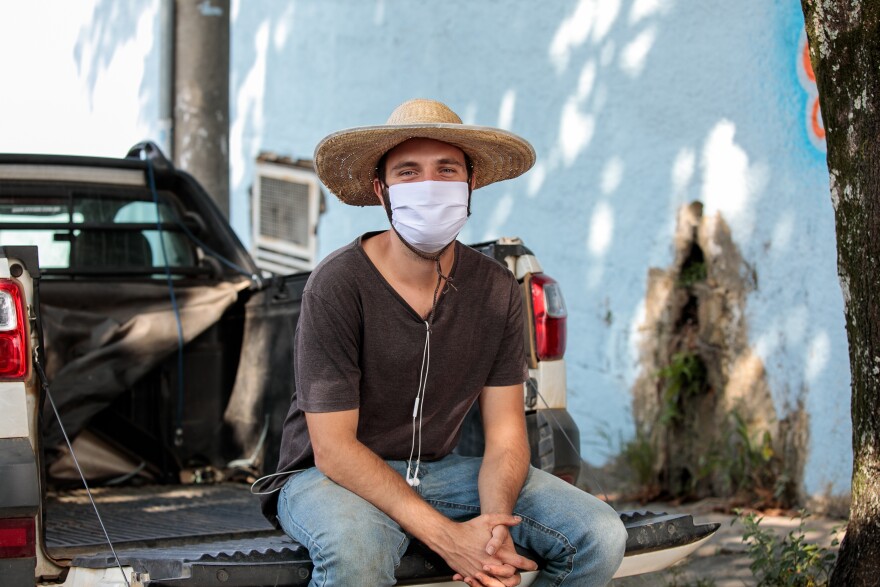In Brazil's favelas, poor urban neighborhoods where residents live in crowded homes and lack basic sanitation, the toll of the coronavirus is expected to be brutal. The informal jobs that sustain 39 million Brazilians, such as selling street food or working temporary construction gigs, are also victims of the stay-at-home order, which started in mid-March. For some in these sprawling settlements, hunger is a threat as real as COVID-19.

Sao Paulo city (Sao Paulo is also the name of the state) is reporting roughly more than 3,000 confirmed COVID-19 deaths and another 3,000 suspected fatalities. The favela Brasilândia is the city district with the most deaths, 156 confirmed or suspected, at last count.
"As COVID-19 is wreaking havoc on our food systems, we are seeing a rollback in progress, not only in Brazil, but across the world," says Agnes Kalibata, special envoy, U.N. Food Systems Summit. "The already undernourished will become even more so as healthy food becomes more expensive."

"People in Brazil are going to be severely damaged by the quarantine," says Rafael Duckur, an organic food producer who grows broccoli, peppers, lemons and other produce on his small, 6.2-acre farm in Morungaba, a town in Sao Paulo state.

Small producers like Duckur mostly rely on the community-supported agriculture (CSA) model, selling directly to consumers on a small scale. The pandemic has meant the loss of some business — sales to public schools and restaurants, for instance — but their customer base is solid. Unsold produce goes to waste, however, as a matter of course.

Duckur wants to bring that surplus to those who need it, while supporting his fellow growers. So in mid-March, as Duckur put out a call on Instagram for help creating boxes of free food and finding those who needed them most. "We, organic producers, know the healing power of good food," he wrote.


Flavia Altenfelder, an organic farmer in a neighboring town, saw the post and reached out to Duckur. Together, they started Pertim, a network of farmers working to help families in the favelas in need of food — and to provide support for local agriculture. Pertim is Portuguese for "close," because the group wants to bring farmers and families closer.

Since launching Pertim, Duckur and Altenfelder have helped three other groups form. The four groups say they have distributed more than 400 boxes of food in four favelas.
Pertim buys food from the growers to fill the boxes sent to the favelas. "The same basket that goes for payers, goes out as donations," says Duckur. Each box contains fruits, eggs, vegetables, coffee and other organic products — even cloth face masks made locally.

Pertim is supported by cash donations and by selling what Duckur calls "Robin Hood" baskets to those who can afford them. The idea is that the cost of buying two such baskets will also provide funds that enable the farmers to give away one free box of food to the favelas.
Brasilandia, with 280,000 people, is the fourth-most populous district in the outskirts of Sao Paulo. There, Pertim is aided by Dimas Reis, a favela resident who is cofounder of a collective working to improve the lives of residents and by a health agent (kind of like a social worker) who finds families who need the boxes.


"It's great to make that link from the farm to the city and reestablish people's connection to food," Reis says.
The logistics of collecting, preparing and distributing the baskets is complex and time-consuming, and Pertim is improving procedures as they go. The food has to be picked up from the producers in a roughly 25-mile range, and cleaned. Then it's trucked to the favela, where volunteers sort the goods into individual boxes.

On a recent trip, 50 boxes were distributed in Brasilandia, delivered directly to people like Rodrigo Gonçalves in Brasilandia. The 19-year-old is the sole provider in his household, which he shares with his mother, two daughters and a niece. "We survive out of my work and with the help of Bolsa Família [a government welfare program]," he says. Gonçalves is a construction auxiliary, which means his jobs are always temporary. He's waiting for the next one.

Duckur hopes that the network of farms in Pertim will expand beyond the four that have signed on in the past two months.
As Reis, Pertim's collaborator in Brasilandia, notes, with little government support in the favelas, "we have to act for ourselves."

Patrícia Monteiro is a documentary photographer based in São Paulo, Brazil. A member of Women Photograph and Girl Gaze, she documents social and gender-based issues in Latin America through photos and, more recently, video. Her instagram handle is @patriciapmonteiro
Copyright 2023 NPR. To see more, visit https://www.npr.org.


